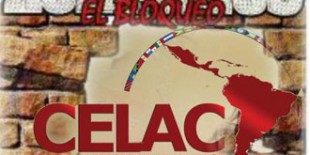
CELAC: An end to Monroeism and to the blockade against Cuba
HAVANA – Why did the United States — before Cuba declared itself socialist and aligned itself with the Soviet Union — begin to structure the State Department’s suggestion to impose sanctions on the island to provoke “hunger, despair and the overthrow of the government” of Fidel Castro?

Why have the U.S. governments, after the end of the Cold War, continued to perceive Cuba as a threat and continued to apply and even tighten the genocidal blockade, when the small nation — with only 11 million inhabitants and armed forces intended only for the national defense — represents no danger to U.S. national security?
Not even the socialist objective of the Cuban nation explains why Washington treats it like an enemy country, if we consider the mutually advantageous relationships that the United States maintains with China and Vietnam.
For more than half a century, the leaders of U.S. politics have wielded dozens of motives to create and sustain the pitiless economic and political war that has sacrificed three generations of Cubans, but have concealed the true cause, the mother of all the motives for the conflict.
What effectively constituted and constitutes a “threat” to the United States is the anti-Monroeist project articulated by the Cuban Revolution when it vindicated the sovereign right of all states to manage their own foreign policy and define their economic interests unfettered by outside pressures and, within that right, the right to regulate, nationalize or even expropriate foreign companies, if such measures are for the public benefit or ensure the viability of the nation.
Long ago, even before the triumph of the Revolution, Washington perceived the danger that such displays of sovereignty might become an example that could extend to other countries in the area and hinder the United States’ hegemonic and neocolonialist status over the hemisphere.
The reason for the North American obsession to topple the Cuban Revolution is, and has always been, invariably a policy of state, not a determination freely managed by each administration, much less determined by the pressure of the counter-revolution of Cuban origin. This was clearly demonstrated when, four months after the failed invasion of Girón Beach, the so-called Alliance for Progress was structured.
The U.S. establishment’s decision to invest $20 billion in support for governments and private businesses in Latin America was unprecedented. It was “the U.S. response to Fidel Castro,” as The New York Times immediately called it, making its true motivation clear.
The Alliance was announced at the White House on March 13, 1961, and launched in August of that year in Punta del Este, Uruguay, at a gathering of the Organization of American States.
Heading the Cuban delegation was Comandante Ernesto Che Guevara, who denounced that an aid program had been presented “with a bagful of gold in one hand
and a barrier to isolate Cuba in the other.” He also said that the financial support, allegedly intended for economic development, was for the purpose of buying, blackmailing and bribing some governments in the subcontinent so they could join the anti-Cuban campaign and counter the struggle of our peoples for their freedom.
In the 54 years since that meeting at Punta del Este, history has changed so much that it recently produced a hemispheric eclosion: the birth of the CELAC. Cuba is chairman pro tempore of that organization and in a few hours Havana will be the site of its Second Summit. The event is expected to deepen further its anti-Monroeist and unifying vocation and, among other actions, to again express itself emphatically against the blockade.
Thus is created the enlightening paradox that today it is the United States who is isolated from Latin America, while Cuba has a leading role in the ensemble of countries from the Great Motherland.
However, we’ll have to wait a long time to see the day when Washington agrees willingly to establish an equal relationship with its hemispheric neighbors.
And we’ll have to wait, although apparently not for long, for U.S. initiatives that, with due respect, focus on changes to its aggressive policies against Cuba.
The island is demonstrating its ability to renew itself and fully establish a relationship with other countries and, in particular, with its neighbors.
The blockade can only be counterproductive and unacceptable from every viewpoint. Today, in all of Latin America and the Caribbean, no government can support it or agree to it, lest its citizens berate it for committing an apostasy.


